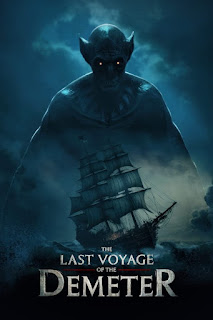Bram Stoker wrote Dracula as an epistolary novel. The story unfolds as a series of letters, journal entries, newspaper articles, and other similar documents, and while this style can be clunky at times, it helps put the reader in the minds of the characters and identify with their perspectives.
The Captain's Log, which details the fate of the Demeter's crew, is one of the book's best passages, working on its own as a self-contained short story within the novel. Stoker captures a true sense of rising dread and despair, and the image of the dead captain tied to the ship's wheel, clutching a crucifix, is a memorably nightmarish image.
The material has a lot of potential, and The Last Voyage of the Demeter (2023) seemingly promises to exploit it. The movie intends to dramatize the entire journey of the Demeter, flesh out its captain and crew, and give us a different kind of Dracula adaptation.
Unfortunately, The Last Voyage of the Demeter emerges as a missed opportunity, containing little of the dread or terror Stoker conjured on page nor succeeding on its own terms as a standalone horror movie. What we have is essentially a monster on a boat gorily dispatching his victims but without much sense of mystery, suspense, or atmosphere.
Admittedly, anyone sitting down to watch the movie is probably aware the monster is Dracula, and in case you aren't aware of the Demeter's fate ahead of time, the film opens with its wreckage on the English coast before flashing back weeks before to the start of the journey. From there, the movie does an admirable job setting the stage and creating some initial unease: the Romani men delivering the cargo decline pay so they can leave before sundown, and we know, as soon as the ship sets sail, the crew will be on their own, at the mercy of the sea and the creature they unknowingly carry.
The movie steps wrong, though, when delivering the horror. In the book, Dracula's initial victims on board the Demeter are thought to have died of the plague, and only gradually does the captain suspect something more dangerous. By then, it's too late, and he's all alone.
The movie forgoes building mystery or ambiguity. Instead of a supernatural presence beyond the crew's comprehension, Dracula is a big-teethed monster that leaps from the shadows, having more in common with the creature from Alien than his literary counterpart, and the attacks, after a while, become repetitive.
Maybe it was a problem of expectations. I went in hoping for a subtle, chilling interpretation, one built on unease and creepy atmosphere, and the movie goes for loud, bloody, kinetic scares. At times, it resembles an action movie more than a horror story. It goes big and goes for broke, when something smaller and quieter feels more appropriate.




No comments:
Post a Comment